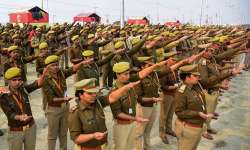Kumbh: UP cops to use radio-frequency identification tags tags for children under 14 years
With a view to tracing the children lost during the massive Kumbh congregation here, the Uttar Pradesh police will be using RFID (radio-frequency identification) tags for kids under 14 years.

With a view to tracing the children lost during the massive Kumbh congregation here, the Uttar Pradesh police will be using RFID (radio-frequency identification) tags for kids under 14 years.
"Kumbh is the biggest congregation in which over 12 crore people are expected to take part over the next 50 days. With a view to ensuring that children do not get lost, we will be using RFID tags on kids under 14 years attending the Kumbh," state Director General of Police (DGP) OP Singh told PTI here on Monday.
He said for the purpose, the department has collaborated with Vodafone, which has agreed to coordinate, and 40,000 RFID tags will be used.
RFID is a form of wireless communication that incorporates the use of electro-magnetic or electrostatic coupling in the radio-frequency portion of the electromagnetic spectrum to uniquely identify an object or a person.
The DGP said 15 modern, integrated, digital lost-and-found centres have been set up in the Kumbh area and these have been integrated with the district police and social media.
An arrangement for display of information through LEDs has also been made with a public address system, he added.
For traffic management, the police will be using an integrated system and an intra-district route diversion, besides crowd analytics and an intelligent traffic management system (ITMS), Singh said.
As many as 20 major parking spots have been developed as satellite towns, equipped with modern amenities such as cloakrooms, health kiosks and eateries to avoid rush in Prayagraj city, he added.
For the first time, an automatic number plate recognition (ANPR) system is being used, the DGP said, adding that it will detect vehicles by colour, licence plate and date-time combinations.
Variable message display boards (VMD) have also been put up for real-time information dissemination, warnings, traffic advice, route guidance and emergency messages, Singh said.